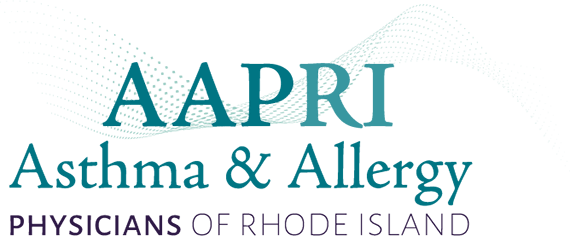Summertime means the return of outdoor activities, but it also means sneezing and sniffling for many allergy sufferers. Seasonal allergies, like other types of allergies, develop when your body’s immune system overreacts to something in the environment. Here in Rhode Island, pollen from grasses, as well as mold (especially with all of the recent wet weather), are common allergy triggers. What can you do to help manage the summer sneezes?

Allergy tips
Being aware of what you’re allergic to can go a long way in helping you deal with allergies. At AAPRI, we can do a comprehensive allergy assessment to determine what’s causing your immune system to go into overdrive, as well as recommend options for effective treatment.
In the meantime, we’ve pulled together some useful resources to help you manage your symptoms. But first, here are some quick tips to help you avoid exposure to pollen:
- Avoid being outdoors when pollen counts are high.
- Keep car windows closed and your air conditioning on recirculate.
- Mow your lawn (wearing a face mask if necessary) to prevent grasses from blooming and pollinating.
- Indoors, use a high-efficiency particulate air (HEPA) filter.
- Shower after spending time outdoors to avoid pollens sitting around in mucous membranes.
To reduce exposure to mold around the house:
- Use dehumidifiers and air conditioners to reduce moisture in your home.
- Keep drip pans from air conditioners, refrigerators, and dehumidifiers clean.
- Fix any leaks or seepage that can result in dampness and mold growth.
- Keep doors open throughout the home to allow for air movement.
- Make sure gutters are working properly.
- Use exhaust fans in the bathroom while showering.
- Don’t allow wet or damp clothing to pile up.
There’s an app for that!
When it comes to managing your seasonal allergies, let technology be your friend. We’ve put together a list of websites and free apps to help you monitor air quality, pollen counts, and more.
Apps:
- Allergy Alert – Pollen.com’s Allergy Alert provides 5 days of weather and allergy forecasts, as well as an allergy diary so you can track your symptoms. The app allows you to check multiple locations with the swipe of a finger, provides information about top allergens in your area, and much more. This app is free app for iPhone and Android devices.
- Allergy Pollen Count – In addition to pollen and mold counts based on actual air samplings conducted by pollen-certified counters of the National Allergy Bureau, this app also provides continuously updated, educational, allergy-related videos featuring Dr. Safadi, a board-certified allergist. This app is free for iPhone devices.
- My Pollen Forecast – This free app for iPhone shares hay fever forecasts and includes a diary for tracking your symptoms for greater insight. Check out maps of local areas with the highest pollen count and learn about the pollens that affect you the most.
- Plume Air Report – Check the air quality wherever you are with Plume Air Report, free for iPhone and Android devices. This worldwide air quality forecaster provides real-time air quality data and 24-hour forecasts help you plan ahead and keep allergen exposure to a minimum.
- Propeller Health – This FDA-approved technology works with existing asthma and COPD inhalers to help people better understand their symptoms for greater control over their allergies. The app helps you identify triggers and track symptoms, as well as check daily asthma air quality information. Free for iPhone and Android devices.
Websites:
- National Allergy Bureau – This most trusted resource from the American Academy of Allergy, Asthma & Immunology provides accurate pollen and mold levels around the country. You can create an account to get personalized email alerts.
- 15 Day Allergy Forecast – Part of The Weather Channel, this site provides a 15-day forecast to predict the likelihood of allergy symptoms. Simply type in your location by city of Zip Code to see how weather conditions may affect your allergies.
- AccuWeather – AccuWeather provides a 3-day forecast for your specific location, broken down by various types of environmental allergens: ragweed pollen, grass pollen, tree pollen, mold, and dust & dander.
- Pollen.com – This site features a variety of information and tools to help you understand and manage your allergies. You can download the Allergy Alert app and register for a free My Pollen.com account where you can customize your dashboard and keep an allergy diary. Pollen.com also provides weather and pollen counts for your area—or any city in U.S.
- Pollen Library – Pollen Library.com provides a comprehensive listing of all plants and trees that grow in Rhode Island. Broken down by county and by season, this helpful resource provides links to each species so you can learn more about it, and ranks the allergens as significant, moderate, or mild.
If you’re suffering from summer allergies, contact us to schedule a consultation today. Our other dedicated team members are here to help you treat the cause and defeat the symptoms.

